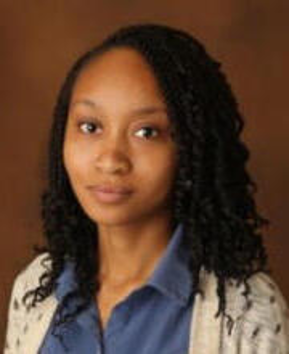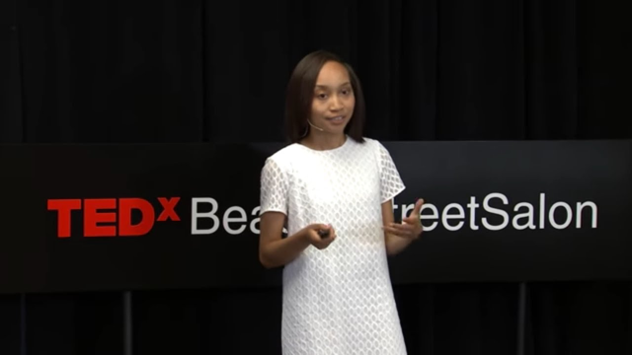
When LaNell Williams was a senior at Wesleyan, she didn’t think she would end up going to graduate school to continue her education in Physics after having earned a Bachelors in the discipline.
“I didn’t even think about applying to graduate school because I had struggled so much academically, mostly because I went to a small charter school in Memphis Tennessee where we didn’t even have Calculus at my High School, or Physics,” Williams said.
Williams struggled to move at the same pace as classmates who had had exposure to courses like Calculus during High School. Her McNair program mentors Suzanne O’Connell and Ronnie Hendrix, however, encouraged her to apply. Williams was granted admission to the Fisk-Vanderbilt Master’s-to-PhD program and accepted her place in the program so she could gain more research experience. Williams’ experience during the program gave her new perspectives on the academic struggles she faced during her undergraduate studies.
“I was doing graduate level courses at Vanderbilt University and doing just as well or even better than my colleagues,” she said. “That’s when it really hit me, that I don’t lack intelligence and I don’t lack capability, I just lack preparation. And once I got over that hump, I felt like I could achieve anything.”
During her Master’s, Williams discovered she had a fascination with soft-condensed matter physics and decided to apply to PhD programs to continue her studies. She matriculated into the Physics program at Harvard, where she joined Professor Vinothan Manoharan’s lab. The Manoharan lab studies soft matter, biophysics, and optics. Williams’ dissertation project involves viral self-assembly.
“Virus self-assembly is a process where you have a set of disordered components that are moving around freely that spontaneously assemble into certain structures,” Williams explained. “We see this process happen with crystal growth processes, like rock candy. We believe that viruses also utilize self-assembly as a part of their replication process. When viruses infect us, they get their RNA into a cell, that cell replicates more of that RNA, some of the RNA turns into core proteins, and you end up with a bath of proteins and RNA floating around the cell which then spontaneously assembles into a new infectious virus. You can actually do this in vitro. If you take viral proteins and RNA and put them in an Eppendorf tube, they will assemble into viruses. This suggests that viral self-assembly is not just a process where things come together and come to be, but that there are laws of physics at play as well.”
Williams’ specific project focuses on the impact of environmental conditions on viral self-assembly. She has studied how temperature, salt concentration, and the amount of protein in a system affect the process.
Williams initially thought she would pursue a career in industry after finishing her PhD, but has since decided that she would like to become a professor.
“I used to joke that I was going to Google straight after graduation, but I do in fact enjoy the process of learning,” Williams said.
The flexibility and ownership that professors have over their research in contrast to roles in industry appealed to Williams. During her time as a graduate student, she also discovered her passion for teaching and mentoring. The ability to enact change at a University was another aspect of professorship that drew Williams to teaching, something she has been involved with on various levels during her time at both Wesleyan and Harvard. Williams founded the Society for Students Underrepresented in STEM at Wesleyan to provide a support network for students.
Although there were other Black students in her introductory Physics classes at Wesleyan, Williams noticed she was more and more alone as she progressed through the major. Students would avoid pairing with Williams during group assignments. They purposefully excluded her from study groups for certain classes, forcing her to sit at tables behind them so she could listen to their discussions. Williams found that Black students in other majors were encountering similar discrimination.
“I was constantly running into Black students across different fields who were all sort of complaining about the same thing, the explicitly racist microaggressions and discouragements, assumptions that you’re not a good scientist, etc.” she said. “A lot of my colleagues attributed my struggle to the fact that I was Black and not the fact that I wasn’t as prepared as they were.”
During her time at Harvard, Williams ran into a former Wesleyan student who had once said as much to her.
“It was funny for me because it showed me that although we had different paths, we ended up in the same place,” she said.
Williams has continued advocating for underrepresented students during her time at Harvard by founding the Women+ of Color Project (W+OCP).
“I remember being at a [Physics PhD] Open House at Harvard and saying that I was disappointed that no women of color were admitted that year,” Williams said. “Someone said basically all the same stereotypes, that Black women aren’t into Physics, they don’t really apply, they don’t normally have the pedigree. And I said, ‘you know, all of those things are false except for one thing: they don’t apply.'”
That conversation prompted Williams to wonder how many Black women had been in the exact same position as her, considering applying to grad school but ultimately choosing not to because of the discrimination they faced. She founded W+OCP to help increase diversity in the graduate application process. The organization hosts a yearly conference and teaches prospective students about life during graduate school, in addition to providing them with resources for applying.
Throughout her academic journey, Williams emphasized that one of the most important lessons she has learned is to not compare herself to others.
“I know some people say keep your blinders on and to some extent you have to learn how to do that; your path is your specific path,” Williams said. “The second you start paying attention to what other people are doing you’ve already lost, so be open minded about that and find the people that can give you tools to get you to where you’re trying to go in the ways that you need that to happen, because it’s going to be different for everyone. The second you start looking to the left, looking to the right, and saying someone’s here, someone’s there, you’ve already lost.”


